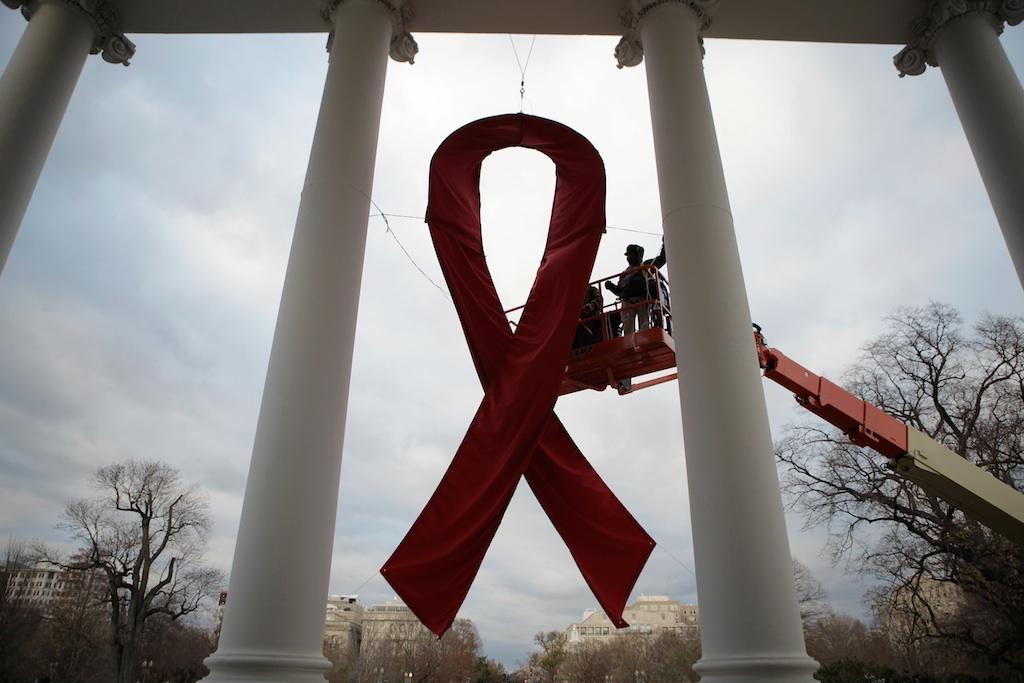On World AIDS Day, remember women
Workers hang a huge red ribbon on the North Portico of the White House one day ahead of World AIDS Day November 30, 2011 in Washington, DC. The day was created in 1988 at the World Summit of Ministers of Health on Programmes in London, England, which brought together health ministers and delegates from 148 different countries.
Elisha Dunn-Georgiou is the Vice President of Advocacy at Population Action International, a nonprofit organization that advocates for women and families' access to contraception in order to improve their health, reduce poverty and protect their environment.
Joyce has 11 children.
Mary says this casually, as if it’s commonplace. And in her experience as a midwife in Uganda, it is.
For women in her community, contraception is largely out of reach. Employment is scarce, so families make ends meet by selling crops from their small gardens. They cannot afford the prices of family planning from private clinics.
“The demand for family planning is so high,” Mary explains. “It is really embarrassing for women to have these frequent deliveries when they have other possible ways of preventing them. So access to family planning should be the first priority.”
The situation Mary describes is not unusual; in fact, it is far too common. 215 million women worldwide are not using an effective method of contraception despite the fact that they want to avoid pregnancy. The largest segment of these women live in sub-Saharan Africa and many are at risk of HIV. Women account for 60% of people living with HIV in sub-Saharan Africa, and young women between the ages of 15-24 are up to eight times more likely to be infected than men of the same age.
December 1st marks World AIDS Day and this year’s theme is “Getting to Zero.” Much of this day will be focused on a celebration of new technology and science that can help prevent HIV through daily treatment and male circumcision. And we should celebrate those advances – but we should also not lose sight of women who need both family planning and HIV services.
One of the central strategies for preventing- mother-to-child-transmission of HIV is to prevent unintended pregnancies through increased access to voluntary family planning services. Providing women with access to family planning services as part of HIV prevention, care and treatment can have a tremendous positive impact on health outcomes for women and children. Unfortunately, despite recent progress, meeting the demand for contraceptives at U.S. supported HIV programs remains a challenge.
The U.S. has a longstanding history of leadership in global health and HIV/AIDS. With the creation of President’s Emergency Plan for AIDS Relief (PEPFAR) in 2003, the U.S. provided unprecedented funds to help fight the global AIDS epidemic and put millions of people on treatment. Under the Obama administration, PEPFAR has focused funding towards more evidence-based prevention approaches, and PEPFAR programs are encouraged to provide family planning information and referrals. This is a positive step forward, but let’s face it – progress still falls far short of meeting the needs of women living with HIV, particularly in those countries without adequate family planning funding or programs. Without robust funding and policy support for family planning, the U.S. misses an opportunity to fully utilize all the tools available to eradicate the HIV/AIDS epidemic and promote healthy women and families.
As the U.S. reaffirms its commitment to creating an AIDS-free generation on this World AIDS Day and prepares for the arrival of the XIX International AIDS Conference in Washington, D.C. next summer, meeting the needs of women and girls must remain central to that commitment. That means not only scaling up access to treatment, but scaling up a comprehensive set of HIV prevention and care services – including access to contraception. As we work together towards the goal of an AIDS-free generation, let’s remember that helping women stay healthy and plan their families is a critical part of the solution.
For more information on the importance of contraception this World AIDS Day, or to share your own thoughts, check out the #rememberwomen hashtag on Twitter.
Every day, reporters and producers at The World are hard at work bringing you human-centered news from across the globe. But we can’t do it without you. We need your support to ensure we can continue this work for another year.
Make a gift today, and you’ll help us unlock a matching gift of $67,000!
